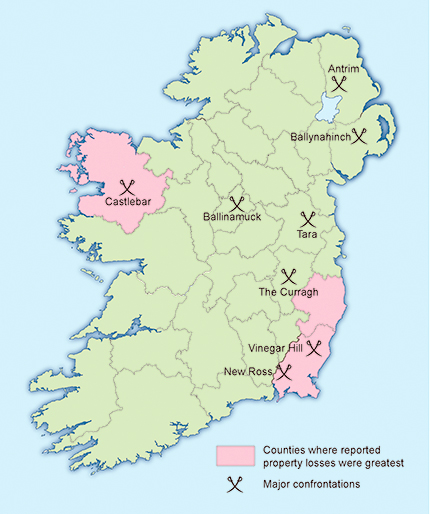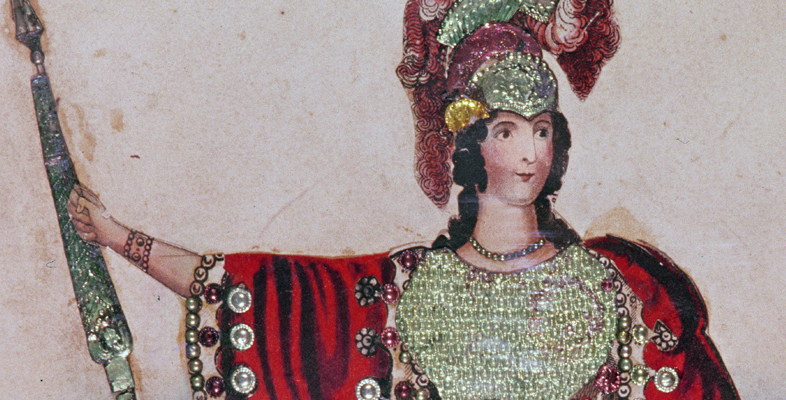1.2 Tension and rebellion
Legislative independence after 1782 put a strain on the relationship between Ireland and Great Britain as Irish patriot MPs called for further economic and political reforms (Bartlett, 2010). In addition to this groundswell of patriotic sentiment, more radical ideas were also emerging. In 1791 the Society of United Irishmen was established in Belfast and branches soon appeared elsewhere in Ireland too. At the outset, membership of the organisation was predominantly Protestant, but increasing numbers of Catholics came to participate in the movement (Dickson, 1999). Like other patriot societies in Ireland and Britain at this time, the United Irishmen were treated with suspicion by the government, and, after the French declaration of war on Britain in 1793, the organisation was suppressed.
Driven underground, its members came to advocate an independent Irish republic inspired by the French model, and in May 1798 took to arms. Despite a failed attempt to seize Dublin Castle, the centre of government in Ireland, the rebellion continued elsewhere in the province of Leinster, and also in Ulster (see Figure 3). On 22 August 1798, a French invasion in support of the rebellion landed at Killala, a port town on Ireland’s west coast, sparking revolt in northern Connaught (Dickson, 1999). Although the 1798 rebellion was quickly suppressed, events in Ireland had posed a real and immediate threat to British security at a time of war.

In response, the British prime minister, William Pitt the Younger, pressed for a union of the kingdoms of Great Britain and Ireland. He argued that Irish legislative independence, achieved by Grattan in 1782, was now a liability and a full political union was necessary for ‘the Wealth, the Power, and the Stability, of the British Empire’ (Pitt, 1799, p. 34). The measure was supported by the majority of British MPs but there was intense opposition on the part of Ireland’s Protestant community. In January 1799, members of the Irish House of Commons rejected a bill for union by a narrow margin. Thereafter, the Irish government went to great efforts to persuade MPs to vote for the measure, even paying large bribes to some (Geoghegan, 2001). These efforts proved effective and ultimately the majority of MPs voted in favour of the union. On 28 March 1800, its terms were approved by both houses of the Irish Parliament and, on 1 January 1801, the union came into force, establishing the new state: the United Kingdom of Great Britain and Ireland.
While anti-union sentiment was evident in a landslide of pamphlets and newspaper articles produced by the Irish press during these years, many of those opposed to the union were not necessarily advocates of democratic, republican government – or opposed to maintaining a connection between Ireland and Britain. Activity 2 explores this seeming paradox further.
Activity 2
Look at the reading below, Hibernicus, English Union is Ireland’s Ruin! Or an Address to the Irish Nation (1799). This is an extract from an anti-union pamphlet, written by an author using the pseudonym (a fictitious or fake name) ‘Hibernicus’. A pamphlet was a short printed publication and a medium closely associated with political controversy.
Read the extract carefully, taking notes if required, and then answer the following questions:
- What arguments does the author offer against the union of Great Britain and Ireland?
- Do you think that the author wants to sever the connection between Great Britain and Ireland completely?
- Why do you think the author chose to use a pseudonym?
Extract from Hibernicus, English union is Ireland's ruin! Or an address to the Irish Nation (Dublin, 1799).
There cannot be a subject, my fellow-country-men, so well worth your attention, and so highly deserving your most serious consideration, as that of a legislative Union betwixt this Country and Great Britain.
We can now no longer doubt the intention of the Ministry in respect to this measure. – We cannot any longer doubt what their wishes and sentiments are with regard to it, they have given you something more than presumptive evidence of this their design; the rumours they are daily circulating amongst you, the Pamphlets they are sending amongst you, and the conversation of the Castle, which is but the echo of the British Minister’s, amount to a plain declaration, that the Cabinet of England and the English Nation are determined to make the daring attempt, of robbing you of that Constitution, which your ancestors had long struggled for, which the Volunteers of Ireland at length obtained, and in defence of which, my countrymen, you yourselves have so lately risqued both your lives and properties. What then, will Irishmen tamely submit that Constitution to be taken away from them, which their renowned forefathers looked up to, and considered as what was most valuable? Will Irishmen at the close of the eighteenth Century, give up their freedom and independence? Will Irishmen silently deliver up their civil, political and religious liberties? [pp. 5-6]
…
Be not too narrow sighted Englishmen, don’t suffer yourselves to be imposed on by any language however specious, or by any promises however flattering. – Think not that Irishmen will ever submit to a Legislative Union. – The Irish Nation love and revere their gracious Sovereign and Constitution. – You have had ample demonstration of our loyalty and attachment at different periods… – Irishmen have fought and conquered in defence of their King and Constitution, and will fight and conquer again in the same honourable cause. – Let me persuade you it will not finally be the interest, nor will it at any time be becoming the dignity of the English Nation even to wish to rob Ireland of her rights.– You may make the attempt, but I am confident you will be defeated, and what must for ever after be the state of the Irish mind? You say yourselves that we will one and all be for ever after jealous of Englishmen; or of any men who would presume to make Ireland dependent, and Irishmen slaves. – You little think that in endeavouring to subdue the spirit of liberty in this Country, you are destroying yourselves, and that for every act of violence you commit against Irish-men, you are but stabbing the English Constitution and planting daggers in the hearts of your own Countrymen. – The very idea of enforcing a legislative Union may be fatal to both countries. Suffer then the connexion to remain on its present footing. – We have shewn ourselves prompt and willing to support you in the war, our Parliament has very liberally granted you large supplies of men and money, the very sinews of war. – Why then Englishmen take away from us that Parliament which has favoured you in all your wishes, and supported you in all your designs? How shall we term such unkind treatment? Ingratitude at least, you yourselves will allow it to be, but I will tell you, it is something more than Ingratitude, I say it is treachery, it is robbery, it is a rapacity, it is tyranny on your side, towards a brave, frank, generous and free-spirited people. [pp. 11-12]
Specimen answer
- The author suggests that the union is not necessary because the Irish people are loyal. In support of this point, references are made to Irishmen fighting in British wars to defend their ‘King and Constitution’, and to the Irish Parliament offering ‘supplies of men and money’ to help the British war effort. The author also argues that the union undermines fundamental rights and privileges guaranteed to the people by the constitution, and is therefore unjust.
- There is some evidence here to suggest that the author wants to maintain the connection between Britain and Ireland. For example, the ‘Englishmen’ are advised to ‘suffer then the connexion to remain on its present footing’.
- It is possible that the author used a pseudonym because they feared prosecution for expressing such strong opinions.
Discussion
Don’t worry if you thought that the author is calling for a complete separation between Britain and Ireland. The overall tone of this extract does give this impression. However, on close inspection you might notice that the author doesn’t question the monarchy or existing representative institutions, but instead calls on Irishmen to defend the liberties and freedoms that they already have. Also, notice how the author associates Irish liberties with ‘English’ ones, arguing that any attempt to suppress Irish liberty would be ‘stabbing the English Constitution’, effectively an act of self-destruction.
The last question was also a little tricky. Authors and publishers did not enjoy ‘free speech’ at this time. Those who published controversial political views, or challenged government actions, in words or writing, could be prosecuted by the state for ‘sedition’. Authors often sought to avoid prosecution by using a pseudonym. The pseudonym in this case is also significant: Hibernia is the Latin word for Ireland, and ‘Hibernicus’ means ‘of or pertaining to the Irish people’.
Although England, Ireland, Scotland and Wales had long shared a monarch, in 1801, for the first time in their history, all four nations of the British Isles were united as one political entity, with one Parliament. Of course the boundaries of the new state, the United Kingdom of Great Britain and Ireland, encompassed a variety of cultural, religious and regional differences. With all of these divisions between, and within, each of the four countries that made up the new state, could all of the people of the British Isles come to think of themselves as one people, or one nation? Section 2 will explore this question further.
